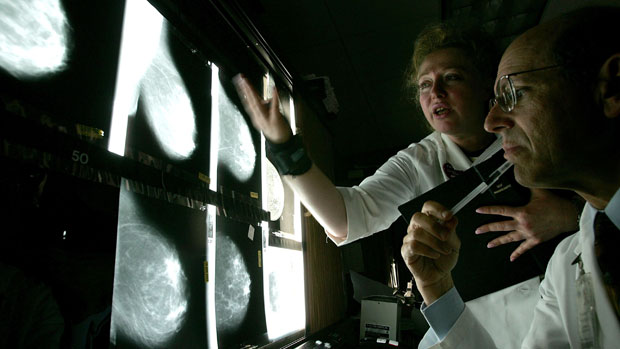Breast cancer calculator: how it works
‘Game-changing’ system analyses genetics and lifestyle factors to calculate overall risk

A free daily email with the biggest news stories of the day – and the best features from TheWeek.com
You are now subscribed
Your newsletter sign-up was successful
A groundbreaking new system that can predict the extent to which a patient is at risk of breast cancer may soon be available in GP surgeries.
According to a study by Cancer Research UK, researchers have created an online calculator that takes into account more than 300 genetic indicators for the disease, alongside factors including the patient’s weight, age at menopause, alcohol consumption, use of hormone replacement therapy and hereditary factors.
Although these individual factors are not indicators of high breast cancer risk, experts say that combining this information with genetic data can give the most comprehensive assessment possible.
The Week
Escape your echo chamber. Get the facts behind the news, plus analysis from multiple perspectives.

Sign up for The Week's Free Newsletters
From our morning news briefing to a weekly Good News Newsletter, get the best of The Week delivered directly to your inbox.
From our morning news briefing to a weekly Good News Newsletter, get the best of The Week delivered directly to your inbox.
Sky News reports that the method - outlined in a paper published in Nature’s Genetics in Medicine journal - is currently being tested by some GPs, practice nurses and genetic counsellors.
“It is hoped it will allow doctors to tailor screening for specific individuals depending on risk,” the broadcaster adds. “For example, it could indicate when a patient should be first called for screening and how often.”
Breast cancer is the most common cancer in the UK, with almost 55,000 women diagnosed each year, many of whom have exhibited genetic and lifestyle factors that might indicate an increased risk.
“Although individually some of these things have a small impact on the likelihood of developing the disease, researchers found that by considering all of them at once, plus family history and genetics, they can identify groups of women who have different risks of developing breast cancer,” reports the EurekAlert! science news site.
A free daily email with the biggest news stories of the day – and the best features from TheWeek.com
Professor Antonis Antoniou, lead author of the research at the University of Cambridge, said: “This is the first time that anyone has combined so many elements into one breast cancer prediction tool.
“It could be a game changer for breast cancer because now we can identify large numbers of women with different levels of risk – not just women who are at high risk.”
He added that while more research and trials are needed, “we hope this means more people can be diagnosed early and survive their disease for longer”.
-
 6 exquisite homes with vast acreage
6 exquisite homes with vast acreageFeature Featuring an off-the-grid contemporary home in New Mexico and lakefront farmhouse in Massachusetts
-
 Film reviews: ‘Wuthering Heights,’ ‘Good Luck, Have Fun, Don’t Die,’ and ‘Sirat’
Film reviews: ‘Wuthering Heights,’ ‘Good Luck, Have Fun, Don’t Die,’ and ‘Sirat’Feature An inconvenient love torments a would-be couple, a gonzo time traveler seeks to save humanity from AI, and a father’s desperate search goes deeply sideways
-
 Political cartoons for February 16
Political cartoons for February 16Cartoons Monday’s political cartoons include President's Day, a valentine from the Epstein files, and more
-
 A real head scratcher: how scabies returned to the UK
A real head scratcher: how scabies returned to the UKThe Explainer The ‘Victorian-era’ condition is on the rise in the UK, and experts aren’t sure why
-
 The truth about vitamin supplements
The truth about vitamin supplementsThe Explainer UK industry worth £559 million but scientific evidence of health benefits is ‘complicated’
-
 How dangerous is the ‘K’ strain super-flu?
How dangerous is the ‘K’ strain super-flu?The Explainer Surge in cases of new variant H3N2 flu in UK and around the world
-
 Covid-19 mRNA vaccines could help fight cancer
Covid-19 mRNA vaccines could help fight cancerUnder the radar They boost the immune system
-
 The ‘menopause gold rush’
The ‘menopause gold rush’Under the Radar Women vulnerable to misinformation and marketing of ‘unregulated’ products
-
 Deadly fungus tied to a pharaoh's tomb may help fight cancer
Deadly fungus tied to a pharaoh's tomb may help fight cancerUnder the radar A once fearsome curse could be a blessing
-
 'Poo pills' and the war on superbugs
'Poo pills' and the war on superbugsThe Explainer Antimicrobial resistance is causing millions of deaths. Could a faeces-filled pill change all that?
-
 How the care industry came to rely on migrant workers
How the care industry came to rely on migrant workersThe Explainer Government crackdown on recruiting workers abroad risks deepening care sector crisis, industry leaders warn